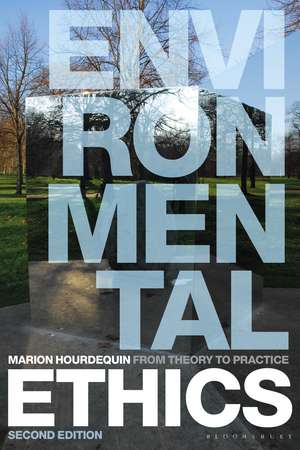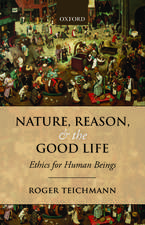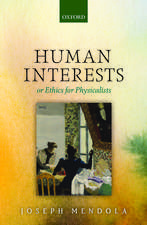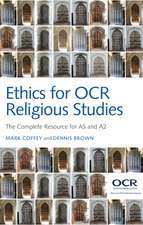Environmental Ethics: From Theory to Practice
Autor Professor Marion Hourdequinen Limba Engleză Paperback – 7 feb 2024
| Toate formatele și edițiile | Preț | Express |
|---|---|---|
| Paperback (2) | 149.46 lei 3-5 săpt. | +30.90 lei 6-12 zile |
| Bloomsbury Publishing – 7 feb 2024 | 149.46 lei 3-5 săpt. | +30.90 lei 6-12 zile |
| Bloomsbury Publishing – 28 ian 2015 | 228.68 lei 6-8 săpt. | |
| Hardback (2) | 409.35 lei 6-8 săpt. | |
| Bloomsbury Publishing – 7 feb 2024 | 409.35 lei 6-8 săpt. | |
| Bloomsbury Publishing – 28 ian 2015 | 973.73 lei 6-8 săpt. |
Preț: 149.46 lei
Preț vechi: 160.77 lei
-7% Nou
Puncte Express: 224
Preț estimativ în valută:
28.60€ • 29.86$ • 23.67£
28.60€ • 29.86$ • 23.67£
Carte disponibilă
Livrare economică 14-28 martie
Livrare express 27 februarie-05 martie pentru 40.89 lei
Preluare comenzi: 021 569.72.76
Specificații
ISBN-13: 9781350185920
ISBN-10: 1350185922
Pagini: 320
Ilustrații: 4 bw illus
Dimensiuni: 156 x 234 x 19 mm
Greutate: 0.48 kg
Ediția:2
Editura: Bloomsbury Publishing
Colecția Bloomsbury Academic
Locul publicării:London, United Kingdom
ISBN-10: 1350185922
Pagini: 320
Ilustrații: 4 bw illus
Dimensiuni: 156 x 234 x 19 mm
Greutate: 0.48 kg
Ediția:2
Editura: Bloomsbury Publishing
Colecția Bloomsbury Academic
Locul publicării:London, United Kingdom
Caracteristici
Covers non-Western ethics with sections on Chinese philosophy, Indigenous ethical perspectives and African relational ethics
Notă biografică
Marion Hourdequin is Professor of Philosophy at Colorado College, USA, and President of the International Society for Environmental Ethics.
Cuprins
List of IllustrationsAcknowledgements Part 1: Environmental Values 1. Bringing Values to Light2. Classical Ethical Theories and the Environment3. Anthropocentrism and its Critics: Broadening Moral Concern4. The Social Dimensions of Environmental Problems Part 2: Environmental Ethics in Practice 5. Food and Agriculture6. Global Climate Change7. Ecological Restoration8. Engaging Environmental Concern, Promoting ChangeNotesReferences Index
Recenzii
Hourdequin writes with clarity, depth, and passion, so the book is suitable for nonspecialists.
What most distinguishes this text ... is its emphasis on practical action ... [Hourdequin] presents a diversity of views sympathetically, explains them accurately and assesses them fairly.
The great strength of the text is the variety of ethical approaches on offer ... Houdequin's book serves as a solid and broad introductory textbook to environmental ethics at an intermediate or senior undergraduate level.
This well-written book works both as an introductory text as well as a review of the topic. The arguments and examples are helpful both for those readers interested in the theoretical background as well as for those more interested in the applied aspects. The examples are well chosen and well presented.
Hourdequin's book addresses environmental ethics from theory to practice through a series of well-structured and thought-provoking chapters. ... [It] stand[s] out from the present-day rich panorama of works regarding environmental ethics and may significantly mark the horizon of future publications in the field.
It is outstanding and commendable as a textbook for both undergraduate and postgraduate alike ... In short, the book is a pleasure to read ... Written at a level that any intelligent layperson will appreciate and enjoy. It is an ideal basic introductory to environmental ethics ... The book is essential reading.
In addition to discussing the usual topics and themes, in this engaging new introduction to environmental ethics Marion Hourdequin draws on the insights of Chinese philosophy and focuses on such issues of contemporary concern as climate change, ecological restoration and the problem of defining sustainability.
Few philosophers and fewer environmental scientists could have written a book that combines a solid grasp of real ethical theory, a full understanding of the current state of the science, and the wisdom that Marion Hourdequin brings to Environmental Ethics. This work is not only an utterly accessible introduction to the field, but a magisterial assessment of the inescapable alternatives it confronts us with.
This engaging and comprehensive introduction to environmental ethics combines directness and clarity with a depth of analysis and distinctiveness of approach that few texts in the field can match. The result is a feast for inquiring minds, an inspiration and aspiration for active ones; specifically, it helps us understand how an environmental ethic can become a lived ethic.
What most distinguishes this text ... is its emphasis on practical action ... [Hourdequin] presents a diversity of views sympathetically, explains them accurately and assesses them fairly.
The great strength of the text is the variety of ethical approaches on offer ... Houdequin's book serves as a solid and broad introductory textbook to environmental ethics at an intermediate or senior undergraduate level.
This well-written book works both as an introductory text as well as a review of the topic. The arguments and examples are helpful both for those readers interested in the theoretical background as well as for those more interested in the applied aspects. The examples are well chosen and well presented.
Hourdequin's book addresses environmental ethics from theory to practice through a series of well-structured and thought-provoking chapters. ... [It] stand[s] out from the present-day rich panorama of works regarding environmental ethics and may significantly mark the horizon of future publications in the field.
It is outstanding and commendable as a textbook for both undergraduate and postgraduate alike ... In short, the book is a pleasure to read ... Written at a level that any intelligent layperson will appreciate and enjoy. It is an ideal basic introductory to environmental ethics ... The book is essential reading.
In addition to discussing the usual topics and themes, in this engaging new introduction to environmental ethics Marion Hourdequin draws on the insights of Chinese philosophy and focuses on such issues of contemporary concern as climate change, ecological restoration and the problem of defining sustainability.
Few philosophers and fewer environmental scientists could have written a book that combines a solid grasp of real ethical theory, a full understanding of the current state of the science, and the wisdom that Marion Hourdequin brings to Environmental Ethics. This work is not only an utterly accessible introduction to the field, but a magisterial assessment of the inescapable alternatives it confronts us with.
This engaging and comprehensive introduction to environmental ethics combines directness and clarity with a depth of analysis and distinctiveness of approach that few texts in the field can match. The result is a feast for inquiring minds, an inspiration and aspiration for active ones; specifically, it helps us understand how an environmental ethic can become a lived ethic.























